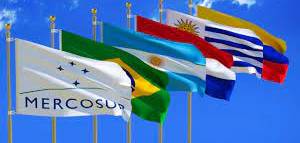
As we have the opportunity to recall in our articles, COP 26 will be held in November 2021 in Glasgow. It will be an opportunity to measure the effectiveness of the climate commitments made by countries around the world since the last meeting in Paris in 2015 which gave rise to the Paris Agreement.
An additional hot topic is likely to invite itself to the negotiations. This is the EU-Mercosur agreement. Heavily criticized at the moment and rejected to date by 450 NGOs, this agreement is in the dark.
It took twenty years of negotiations for the EU-Mercosur agreement to see the light of day in 2019. On paper, it encompasses 780 million people and ensures a free trade area between the European Union and a group of countries of South America making up what is called Mercosur: Argentina, Brazil, Uruguay and Venezuela. The principle is to ban customs duties and eliminate non-tariff barriers in order to facilitate and promote trade between these two zones. On the one hand, the European Union wishes to export its cars as well as products from the chemical, pharmaceutical, food, textile and cosmetics sectors. On the other hand, the Mercosur alliance hopes to sell large quantities of beef, poultry, frozen products and ethanol to Europe. Recall that the extensive breeding of cattle in Brazil is at the center of criticism leveled at the Brazilian government since it is the main cause of deforestation.
The estimated amount of this trade is around 45 billion euros.
Although an agreement in principle was reached on June 28, 2019, the final texts were neither finalized, nor voted, nor ratified, and therefore did not enter into force.
This agreement is not without leading to questions and the massive rejection of a very large number of associations, corporations, farmers and politicians in Europe. In question the gray areas surrounding the agreement in terms of climate impacts and commercial competition.
First, the deal comes at a time when South America is being blamed for its calamitous management of the Amazon forest. Bolsonaro's Brazil, in particular, is accused of contributing to large-scale deforestation. And it is not the recent news showing gigantic fires that will soften the positions. They have only aroused more indignation and discredited, if still possible, the policies of the Brazilian government and above all, its leader. According to NGOs, such an agreement would lead this entire geographic area to an even more perilous situation. This is in substance what the Stop-Ceta Mercosur collective, opposed to the project, which includes among others associations that we often quote in our journal: Attac, Greenpeace, Oxfam, Extinction Rebellion UK. "The agreement will worsen the destruction and collapse of the biodiversity of the Amazon, Cerrado and Gran Chaco due to the increase in quotas for the importation of livestock and ethanol to Europe, perpetuating a pattern extractivist agriculture based on overgrazing, the expansion of intensive animal husbandry with feedlots for livestock, and monocultures dependent on pesticides and chemicals ”
In addition, the agricultural world on both sides of the Atlantic views this agreement very badly. There are many questions and fears. T he European farmers and farmers fear a strong unfair competition due to environmental, social or uneven South American health. According to the collective, it is to be feared that the future agreement will “ destroy the means of subsistence of very many peasants and small family farms in Europe and South America ”.
For their part, the various European politicians are very reluctant to sign the agreement in its current form. They expect strong and concrete actions from the countries of South America. " Simple political commitments will not be enough to ratify the mixed agreement between the European Union and the Mercosur countries", declared Franck Riester on March 2, during the Informal Foreign Affairs Council; adding to require " tangible and objectivable guarantees" of the four countries concerned " on the environment and health standards" , and not a simple declaration. The minister even went so far as to consider a " European technical and legal instrument making it possible to verify that each import has no negative impact on deforestation " . On the health issue of imported products, he reiterated his unequivocal position: “ we need means of verification. We want concrete, tangible, verifiable, quantifiable guarantees ”.
In the end, it is clear that vagueness and uncertainty reign around the agreement. Not to mention the disregard that some South American governments make of climate issues; preferring blind economic expansion to them. One thing is certain, it does not go in the direction of what the COP 26 will require. There are therefore a few months left to fine-tune it and demonstrate its ecological relevance. If it continues not to tick the environmental and sustainable development boxes in an efficient and supervised manner, the 450 NGOs, which have been standing up for months, will continue to demand its outright abandonment.
Posted on 2021-03-22 18:03








Comments